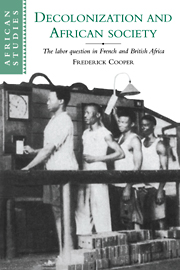Book contents
- Frontmatter
- Contents
- List of tables and figure
- Preface
- List of abbreviations
- Map of French and British colonial Africa
- 1 Introduction
- Part I The dangers of expansion and the dilemmas of reform
- Part II Imperial fantasies and colonial crises
- Part III The imagining of a working class
- Part IV Devolving power and abdicating responsibility
- Introduction
- 10 The burden of declining empire
- 11 Delinking colony and metropole: French Africa in the 1950s
- 12 Nation, international trade unionism, and race: anglophone Africa in the 1950s
- Conclusion: the social meaning of decolonization
- Conclusion
- Notes
- Bibliography
- Index
- OTHER BOOKS IN THE SERIES
10 - The burden of declining empire
Published online by Cambridge University Press: 22 February 2010
- Frontmatter
- Contents
- List of tables and figure
- Preface
- List of abbreviations
- Map of French and British colonial Africa
- 1 Introduction
- Part I The dangers of expansion and the dilemmas of reform
- Part II Imperial fantasies and colonial crises
- Part III The imagining of a working class
- Part IV Devolving power and abdicating responsibility
- Introduction
- 10 The burden of declining empire
- 11 Delinking colony and metropole: French Africa in the 1950s
- 12 Nation, international trade unionism, and race: anglophone Africa in the 1950s
- Conclusion: the social meaning of decolonization
- Conclusion
- Notes
- Bibliography
- Index
- OTHER BOOKS IN THE SERIES
Summary
A French journalist reported on his study of development efforts in West Africa in 1956, “FIDES and its fistful of billions [of francs] amount to nothing in the face of discouraging distances, exhausted land, the routines of Africans, and the immense territories without men and water.” The come-down from the high stakes raised in launching development plans was a hard one: too much was expected politically as well as economically. The infrastructure of French and British territories proved incapable of handling even the capital goods imports intended to jump-start commerce; lack of trained economists slowed the planning process and shortages of technical personnel slowed implementation; metropolitan economies could not supply sufficient capital goods or hard currency to buy them abroad; the appropriated funds – small as they were in comparison to Africa's needs – could not be spent at the rate projected; inflation and the high cost of imports and metropolitan personnel nonetheless gobbled up project budgets; ignorance of African conditions led to enormous waste; shortages of housing and consumer goods led to labor conflict and escalating labor costs. The costs of reviving production in the metropoles – which soon proved expensive but more realistic than capitalizing on tropical commodities to save imperial economies – cut into the political support for overseas development, and American advisors did not want too much Marshall Plan aid diverted to imperial preserves partially removed from open world trade. This chapter cannot probe these questions in depth, but it does document the spirit of pessimism which overtook reformist imperialism in the 1950s and which both reflected and affected the posing of the labor question.
- Type
- Chapter
- Information
- Decolonization and African SocietyThe Labor Question in French and British Africa, pp. 392 - 406Publisher: Cambridge University PressPrint publication year: 1996

